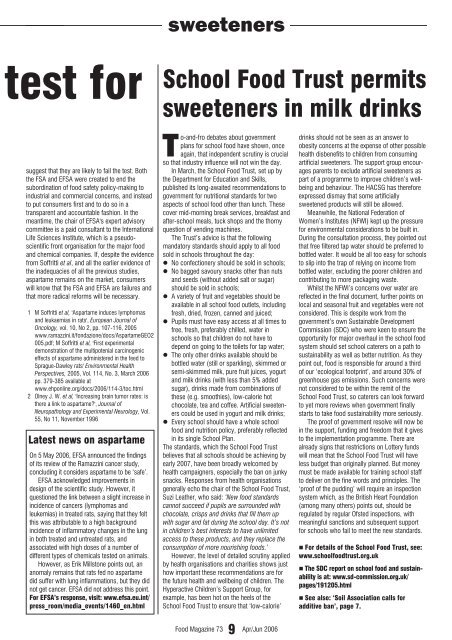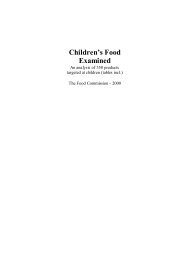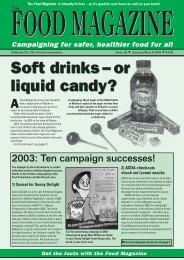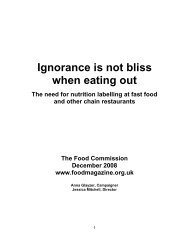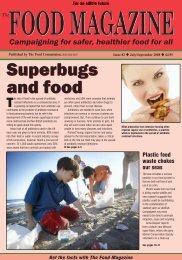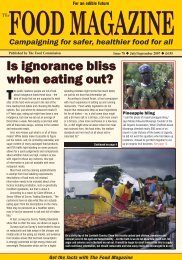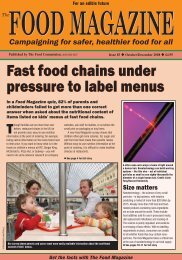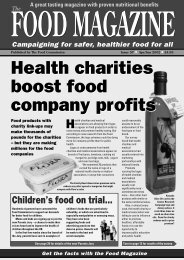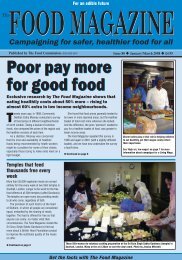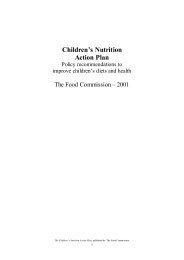Campaigning for safer, healthier food for all - The Food Commission
Campaigning for safer, healthier food for all - The Food Commission
Campaigning for safer, healthier food for all - The Food Commission
You also want an ePaper? Increase the reach of your titles
YUMPU automatically turns print PDFs into web optimized ePapers that Google loves.
sweeteners<br />
test <strong>for</strong><br />
School <strong>Food</strong> Trust permits<br />
sweeteners in milk drinks<br />
suggest that they are likely to fail the test. Both<br />
the FSA and EFSA were created to end the<br />
subordination of <strong>food</strong> safety policy-making to<br />
industrial and commercial concerns, and instead<br />
to put consumers first and to do so in a<br />
transparent and accountable fashion. In the<br />
meantime, the chair of EFSA's expert advisory<br />
committee is a paid consultant to the International<br />
Life Sciences Institute, which is a pseudoscientific<br />
front organisation <strong>for</strong> the major <strong>food</strong><br />
and chemical companies. If, despite the evidence<br />
from Soffritti et al, and <strong>all</strong> the earlier evidence of<br />
the inadequacies of <strong>all</strong> the previous studies,<br />
aspartame remains on the market, consumers<br />
will know that the FSA and EFSA are failures and<br />
that more radical re<strong>for</strong>ms will be necessary.<br />
1 M Soffritti et al, 'Aspartame induces lymphomas<br />
and leukaemias in rats', European Journal of<br />
Oncology, vol. 10, No 2, pp. 107-116, 2005<br />
www.ramazzini.it/fondazione/docs/AspartameGEO2<br />
005.pdf; M Soffritti et al, 'First experimental<br />
demonstration of the multipotenial carcinogenic<br />
effects of aspartame administered in the feed to<br />
Sprague-Dawley rats' Environmental Health<br />
Perspectives, 2005, Vol. 114, No. 3, March 2006<br />
pp. 379-385 available at<br />
www.ehponline.org/docs/2006/114-3/toc.html<br />
2 Olney J. W. et al, 'Increasing brain tumor rates: is<br />
there a link to aspartame?', Journal of<br />
Neuropathology and Experimental Neurology, Vol.<br />
55, No 11, November 1996<br />
Latest news on aspartame<br />
On 5 May 2006, EFSA announced the findings<br />
of its review of the Ramazzini cancer study,<br />
concluding it considers aspartame to be ‘safe’.<br />
EFSA acknowledged improvements in<br />
design of the scientific study. However, it<br />
questioned the link between a slight increase in<br />
incidence of cancers (lymphomas and<br />
leukemias) in treated rats, saying that they felt<br />
this was attributable to a high background<br />
incidence of inflammatory changes in the lung<br />
in both treated and untreated rats, and<br />
associated with high doses of a number of<br />
different types of chemicals tested on animals.<br />
However, as Erik Millstone points out, an<br />
anomaly remains that rats fed no aspartame<br />
did suffer with lung inflammations, but they did<br />
not get cancer. EFSA did not address this point.<br />
For EFSA’s response, visit: www.efsa.eu.int/<br />
press_room/media_events/1460_en.html<br />
To-and-fro debates about government<br />
plans <strong>for</strong> school <strong>food</strong> have shown, once<br />
again, that independent scrutiny is crucial<br />
so that industry influence will not win the day.<br />
In March, the School <strong>Food</strong> Trust, set up by<br />
the Department <strong>for</strong> Education and Skills,<br />
published its long-awaited recommendations to<br />
government <strong>for</strong> nutritional standards <strong>for</strong> two<br />
aspects of school <strong>food</strong> other than lunch. <strong>The</strong>se<br />
cover mid-morning break services, breakfast and<br />
after-school meals, tuck shops and the thorny<br />
question of vending machines.<br />
<strong>The</strong> Trust’s advice is that the following<br />
mandatory standards should apply to <strong>all</strong> <strong>food</strong><br />
sold in schools throughout the day:<br />
No confectionery should be sold in schools;<br />
No bagged savoury snacks other than nuts<br />
and seeds (without added salt or sugar)<br />
should be sold in schools;<br />
A variety of fruit and vegetables should be<br />
available in <strong>all</strong> school <strong>food</strong> outlets, including<br />
fresh, dried, frozen, canned and juiced;<br />
Pupils must have easy access at <strong>all</strong> times to<br />
free, fresh, preferably chilled, water in<br />
schools so that children do not have to<br />
depend on going to the toilets <strong>for</strong> tap water;<br />
<strong>The</strong> only other drinks available should be<br />
bottled water (still or sparkling), skimmed or<br />
semi-skimmed milk, pure fruit juices, yogurt<br />
and milk drinks (with less than 5% added<br />
sugar), drinks made from combinations of<br />
these (e.g. smoothies), low-calorie hot<br />
chocolate, tea and coffee. Artificial sweeteners<br />
could be used in yogurt and milk drinks;<br />
Every school should have a whole school<br />
<strong>food</strong> and nutrition policy, preferably reflected<br />
in its single School Plan.<br />
<strong>The</strong> standards, which the School <strong>Food</strong> Trust<br />
believes that <strong>all</strong> schools should be achieving by<br />
early 2007, have been broadly welcomed by<br />
health campaigners, especi<strong>all</strong>y the ban on junky<br />
snacks. Responses from health organisations<br />
gener<strong>all</strong>y echo the chair of the School <strong>Food</strong> Trust,<br />
Suzi Leather, who said: ‘New <strong>food</strong> standards<br />
cannot succeed if pupils are surrounded with<br />
chocolate, crisps and drinks that fill them up<br />
with sugar and fat during the school day. It’s not<br />
in children’s best interests to have unlimited<br />
access to these products, and they replace the<br />
consumption of more nourishing <strong>food</strong>s.’<br />
However, the level of detailed scrutiny applied<br />
by health organisations and charities shows just<br />
how important these recommendations are <strong>for</strong><br />
the future health and wellbeing of children. <strong>The</strong><br />
Hyperactive Children’s Support Group, <strong>for</strong><br />
example, has been hot on the heels of the<br />
School <strong>Food</strong> Trust to ensure that ‘low-calorie’<br />
drinks should not be seen as an answer to<br />
obesity concerns at the expense of other possible<br />
health disbenefits to children from consuming<br />
artificial sweeteners. <strong>The</strong> support group encourages<br />
parents to exclude artificial sweeteners as<br />
part of a programme to improve children’s wellbeing<br />
and behaviour. <strong>The</strong> HACSG has there<strong>for</strong>e<br />
expressed dismay that some artifici<strong>all</strong>y<br />
sweetened products will still be <strong>all</strong>owed.<br />
Meanwhile, the National Federation of<br />
Women’s Institutes (NFWI) kept up the pressure<br />
<strong>for</strong> environmental considerations to be built in.<br />
During the consultation process, they pointed out<br />
that free filtered tap water should be preferred to<br />
bottled water. It would be <strong>all</strong> too easy <strong>for</strong> schools<br />
to slip into the trap of relying on income from<br />
bottled water, excluding the poorer children and<br />
contributing to more packaging waste.<br />
Whilst the NFWI’s concerns over water are<br />
reflected in the final document, further points on<br />
local and seasonal fruit and vegetables were not<br />
considered. This is despite work from the<br />
government’s own Sustainable Development<br />
<strong>Commission</strong> (SDC) who were keen to ensure the<br />
opportunity <strong>for</strong> major overhaul in the school <strong>food</strong><br />
system should set school caterers on a path to<br />
sustainability as well as better nutrition. As they<br />
point out, <strong>food</strong> is responsible <strong>for</strong> around a third<br />
of our ‘ecological footprint’, and around 30% of<br />
greenhouse gas emissions. Such concerns were<br />
not considered to be within the remit of the<br />
School <strong>Food</strong> Trust, so caterers can look <strong>for</strong>ward<br />
to yet more reviews when government fin<strong>all</strong>y<br />
starts to take <strong>food</strong> sustainability more seriously.<br />
<strong>The</strong> proof of government resolve will now be<br />
in the support, funding and freedom that it gives<br />
to the implementation programme. <strong>The</strong>re are<br />
already signs that restrictions on Lottery funds<br />
will mean that the School <strong>Food</strong> Trust will have<br />
less budget than origin<strong>all</strong>y planned. But money<br />
must be made available <strong>for</strong> training school staff<br />
to deliver on the fine words and principles. <strong>The</strong><br />
‘proof of the pudding’ will require an inspection<br />
system which, as the British Heart Foundation<br />
(among many others) points out, should be<br />
regulated by regular Ofsted inspections, with<br />
meaningful sanctions and subsequent support<br />
<strong>for</strong> schools who fail to meet the new standards.<br />
For details of the School <strong>Food</strong> Trust, see:<br />
www.school<strong>food</strong>trust.org.uk<br />
<strong>The</strong> SDC report on school <strong>food</strong> and sustainability<br />
is at: www.sd-commission.org.uk/<br />
pages/191205.html<br />
See also: ‘Soil Association c<strong>all</strong>s <strong>for</strong><br />
additive ban’, page 7.<br />
<strong>Food</strong> Magazine 73 9<br />
Apr/Jun 2006


